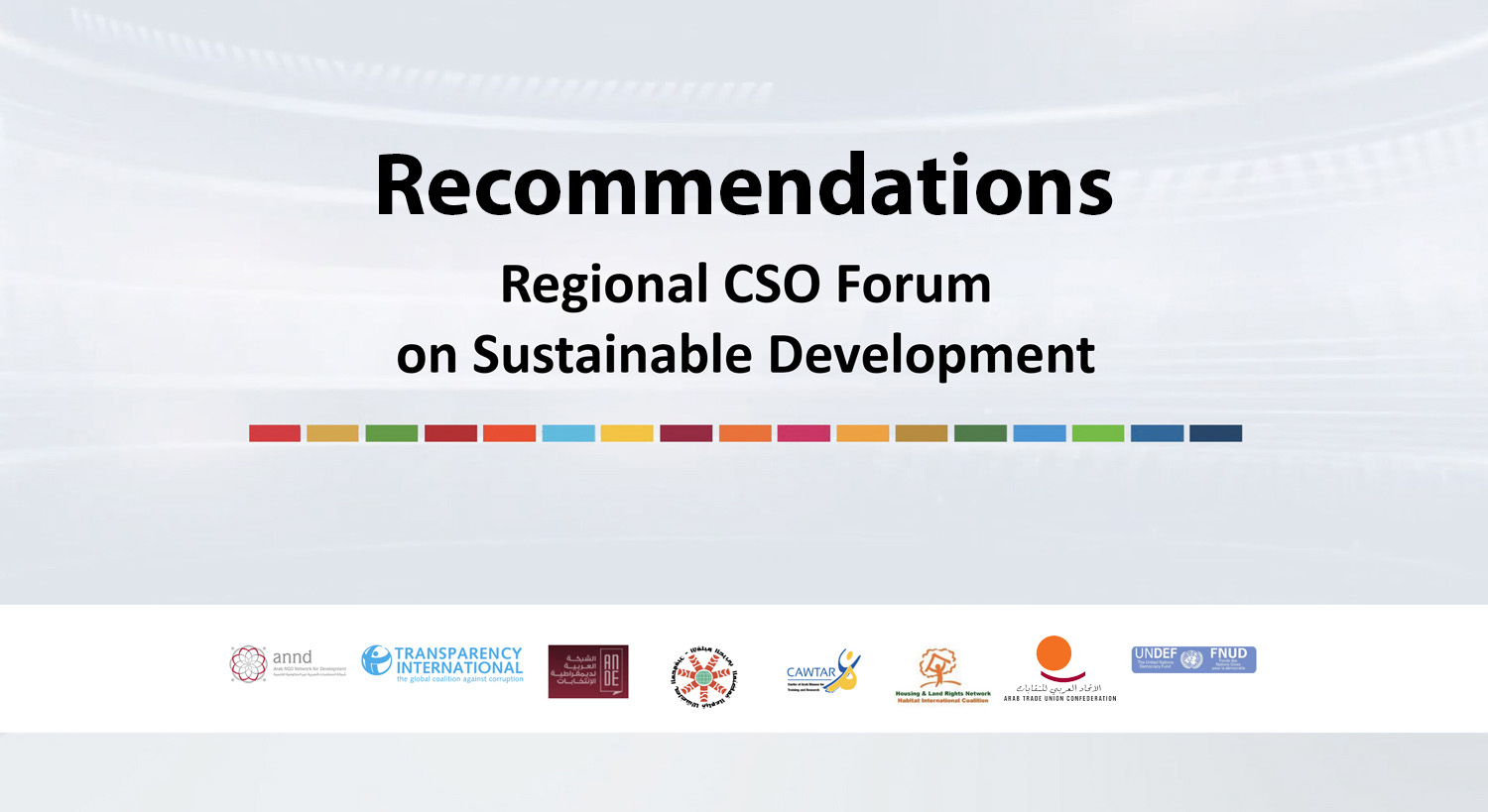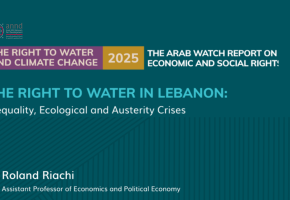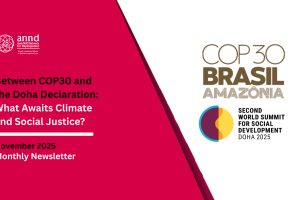
Recommendations: Regional Meeting for CSOs on Sustainable Development - March 2022 - Beirut
Recommendations: Regional Meeting for CSOs on Sustainable Development - Click here to download the full report
13-14 March 2022 - Beirut
The Regional Sustainable Development Platform organized “The Regional Meeting for CSOs on Sustainable Development” on March 13 and 14 2022 in Beirut; more than 60 representatives of Arab civil society organizations, experts and academics attended the meeting physically and via Zoom. The Regional Sustainable Development Platform is a framework of regional networks monitoring sustainable development action and the extent of states’ commitment to implementing the 2030 Agenda. It includes the Arab NGO Network for Development (ANND), the Arab Women Center for Training and Research (CAWTAR), the Arab Trade Union Confederation (ATUC), the Arab Forum for Disability (AFD), Habitat International Coalition, Arab Network for Democratic Elections, and the Arab branches of Transparency International.
The meeting aims to promote the dialogue between the civil society organizations in the context of the preparations for the Regional Sustainable Development Forum organized by the United Nations’ Economic and Social Commission for Western Asia (ESCWA) in collaboration with the League of Arab States between March 15 and 17.
The outcomes of this meeting will constitute input for the Arab Forum for Sustainable Development along with the report of the Forum that will be submitted to the High-Level Political Forum on Sustainable Development held annually in June by the United Nations’ General Assembly in New York in order to review the progress achieved in the implementation of the 2030 Agenda for Sustainable Development.
The meeting focused on the following topics:
Session 1: COVID-19 and De-development in the Arab Region
Session 2: Macroeconomic Failures and Deepening Inequalities
Session 3: Democratic Transition and Nation-Building in the Region
Session 4: Solutions for Sustainability in the Arab Region
Session 5: Partnership for Development and Means of Implementation
Recommendations:
1. Emphasize the importance of financing for development, but first and foremost stress the soundness of the policies being applied.
2. Establish a fair, comprehensive and progressive tax system with the aim of sharing wealth in an equitable manner at various levels, including at the global level.
3. Define the role of the private sector in the field of development and the framework of accountability and transparency.
4. Enhance the access to information and data to better enrich the decision-making process, ensure awareness of macroeconomic policies, strengthen fiscal space and support social protection in line with the Sustainable Development Goals and ILO standards.
5. Encourage investments in research and development and green technologies and facilitate access to financing for technology-related investments.
6. Consider human rights principles in establishing global development assistance plans and strategies and apply the Busan Principles.
7. Restructure global, regional and national debts, canceling corrupt and illegitimate country debts, especially countries that grapple with wars, based on international and cross-border responsibility of creditor countries and institutions.
8. Eliminate military assistance from the definition of official development assistance, especially in countries experiencing conflicts.
9. Ensure donors and countries in development assistance committee focus on creating political and economic strategies to efficiently mitigate the conflicts and wars in these countries.
10. Give ownership to people and make them participate in decision-making and implementation.
11. Find solutions to transform humanitarian aid into development assistance by using it differently.
Annex: Youth Forum Recommendations
The Arab NGO Network for Development organized a youth forum on development issues within the framework of the “Safir” project, from March 12 to 14 in Beirut, Lebanon; it brought together more than fifty young women and men, that had taken part in a training on advocacy and sustainable development goals involving with about 300 young men and women in eight Arab countries.
The Forum succeeded in creating a space for dialogue between the youth participating in the “Safir” project, civil society organizations and development actors, after completing training activities and framing development priorities for youth in the Arab region and preparing them to participate in the Arab Forum for Sustainable Development.
Throughout the three days of the Forum, young men and women succeeded in identifying development challenges facing their countries and the Arab region, which allowed them to frame priorities at the regional level and to submit recommendations that enhance the participation of youth in the development process. Below are some of the most important recommendations:
• Establish youth advisory councils that ensure their participation in decision-making at the local and national levels, guarantee expanded terms of reference and competencies, and create a monitoring and accountability mechanism. This allows cooperation between youth and other groups of decision-makers such as the government, civil society and the private sector, and promotes the involvement of youth in formulating national strategic plans to convey and translate youth priorities and acknowledge them as actors in public policies and not as a simple tool.
• Ensure fair and equal participation of all youth groups at the national level by adopting a human rights’ approach (inclusion policies, geographic considerations, gender, etc..).
• Support micro youth projects and not neglect them, and support equitable and fair decision-making processes to obtain funding for youth projects without bureaucratic procedures.
• Allocate an independent ministry for youth.
• Amend laws for youth representation in councils and legislative positions, such as reduce the age for candidacy, and promote administrative decentralization.
• Build partnerships with civil society institutions and organizations concerned with development issues and promote the involvement of youth in the structures of civil society institutions.
• Create media platforms and youth forums in the Arab region through which young people express their opinions and participate in the decision-making process.
• Promote the social responsibility of the private sector to develop and the support the process of integrating young people into local communities.
• Support and train Arab youth, building their capacities, and educating them about citizenship and about their rights and duties in laws, specifically in the political field.
• Consider the cultural dimension in the process of integrating young people into local communities.
• Promote good governance, as it includes all sectors and fields, and apply mechanisms for accessing information, enabling young people to accurately address urgent issues.
• Provide a comprehensive and equal social protection system for all, which would encourage young people to engage more in public life.
Recommendations: Regional Meeting for CSOs on Sustainable Development - Click here to download the full report
Recent publications

